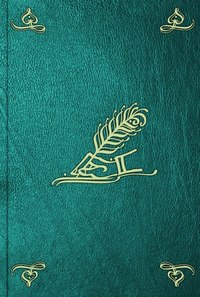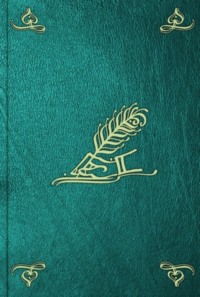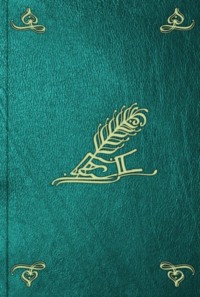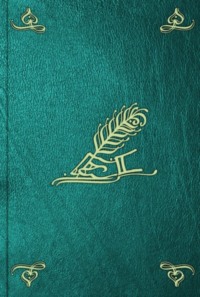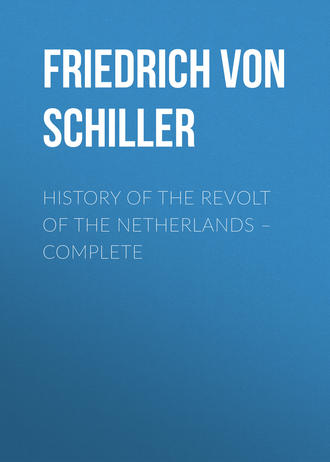 полная версия
полная версияHistory of the Revolt of the Netherlands – Complete
The Roman Church had ever been a main support of the royal power, and it was only natural that it should be so. Its golden time was the bondage of the human intellect, and, like royalty, it had gained by the ignorance and weakness of men. Civil oppression made religion more necessary and more dear; submission to tyrannical power prepares the mind for a blind, convenient faith, and the hierarchy repaid with usury the services of despotism. In the provinces the bishops and prelates were zealous supporters of royalty, and ever ready to sacrifice the welfare of the citizen to the temporal advancement of the church and the political interests of the sovereign.
Numerous and brave garrisons also held the cities in awe, which were at the same time divided by religious squabbles and factions, and consequently deprived of their strongest support – union among themselves. How little, therefore, did it require to insure this preponderance of Philip’s power, and how fatal must have been the folly by which it was lost.
But Philip’s authority in these provinces, however great, did not surpass the influence which the Spanish monarchy at that time enjoyed throughout Europe. No state ventured to enter the arena of contest with it. France, its most dangerous neighbor, weakened by a destructive war, and still more by internal factions, which boldly raised their heads during the feeble government of a child, was advancing rapidly to that unhappy condition which, for nearly half a century, made it a theatre of the most enormous crimes and the most fearful calamities. In England Elizabeth could with difficulty protect her still tottering throne against the furious storms of faction, and her new church establishment against the insidious arts of the Romanists. That country still awaited her mighty call before it could emerge from a humble obscurity, and had not yet been awakened by the faulty policy of her rival to that vigor and energy with which it finally overthrew him. The imperial family of Germany was united with that of Spain by the double ties of blood and political interest; and the victorious progress of Soliman drew its attention more to the east than to the west of Europe. Gratitude and fear secured to Philip the Italian princes, and his creatures ruled the Conclave. The monarchies of the North still lay in barbarous darkness and obscurity, or only just began to acquire form and strength, and were as yet unrecognized in the political system of Europe. The most skilful generals, numerous armies accustomed to victory, a formidable marine, and the golden tribute from the West Indies, which now first began to come in regularly and certainly – what terrible instruments were these in the firm and steady hand of a talented prince Under such auspicious stars did King Philip commence his reign.
Before we see him act we must first look hastily into the deep recesses of his soul, and we shall there find a key to his political life. Joy and benevolence were wholly wanting in the composition of his character. His temperament, and the gloomy years of his early childhood, denied him the former; the latter could not be imparted to him by men who had renounced the sweetest and most powerful of the social ties. Two ideas, his own self and what was above that self, engrossed his narrow and contracted mind. Egotism and religion were the contents and the title-page of the history of his whole life. He was a king and a Christian, and was bad in both characters; he never was a man among men, because he never condescended but only ascended. His belief was dark and cruel; for his divinity was a being of terror, from whom he had nothing to hope but everything to fear. To the ordinary man the divinity appears as a comforter, as a Saviour; before his mind it was set up as an image of fear, a painful, humiliating check to his human omnipotence. His veneration for this being was so much the more profound and deeply rooted the less it extended to other objects. He trembled servilely before God because God was the only being before whom he had to tremble. Charles V. was zealous for religion because religion promoted his objects. Philip was so because he had real faith in it. The former let loose the fire and the sword upon thousands for the sake of a dogma, while he himself, in the person of the pope, his captive, derided the very doctrine for which he had sacrificed so much human blood. It was only with repugnance and scruples of conscience that Philip resolved on the most just war against the pope, and resigned all the fruits of his victory as a penitent malefactor surrenders his booty. The Emperor was cruel from calculation, his son from impulse. The first possessed a strong and enlightened spirit, and was, perhaps, so much the worse as a man; the second was narrow-minded and weak, but the more upright.
Both, however, as it appears to me, might have been better men than they actually were, and still, on the whole, have acted on the very same principles. What we lay to the charge of personal character of an individual is very often the infirmity, the necessary imperfection of universal human nature. A monarchy so great and so powerful was too great a trial for human pride, and too mighty a charge for human power. To combine universal happiness with the highest liberty of the individual is the sole prerogative of infinite intelligence, which diffuses itself omnipresently over all. But what resource has man when placed in the position of omnipotence? Man can only aid his circumscribed powers by classification; like the naturalist, he establishes certain marks and rules by which to facilitate his own feeble survey of the whole, to which all individualities must conform. All this is accomplished for him by religion. She finds hope and fear planted in every human breast; by making herself mistress of these emotions, and directing their affections to a single object, she virtually transforms millions of independent beings into one uniform abstract. The endless diversity of the human will no longer embarrasses its ruler – now there exists one universal good, one universal evil, which he can bring forward or withdraw at pleasure, and which works in unison with himself even when absent. Now a boundary is established before which liberty must halt; a venerable, hallowed line, towards which all the various conflicting inclinations of the will must finally converge. The common aim of despotism and of priestcraft is uniformity, and uniformity is a necessary expedient of human poverty and imperfection. Philip became a greater despot than his father because his mind was more contracted, or, in other words, he was forced to adhere the more scrupulously to general rules the less capable he was of descending to special and individual exceptions. What conclusion could we draw from these principles but that Philip II. could not possibly have any higher object of his solicitude than uniformity, both in religion and in laws, because without these he could not reign?
And yet he would have shown more mildness and forbearance in his government if he had entered upon it earlier. In the judgment which is usually formed of this prince one circumstance does not appear to be sufficiently considered in the history of his mind and heart, which, however, in all fairness, ought to be duly weighed. Philip counted nearly thirty years when he ascended the Spanish throne, and the early maturity of his understanding had anticipated the period of his majority. A mind like his, conscious of its powers, and only too early acquainted with his high expectations, could not brook the yoke of childish subjection in which he stood; the superior genius of the father, and the absolute authority of the autocrat, must have weighed heavily on the self-satisfied pride of such a son. The share which the former allowed him in the government of the empire was just important enough to disengage his mind from petty passions and to confirm the austere gravity of his character, but also meagre enough to kindle a fiercer longing for unlimited power. When he actually became possessed of uncontrolled authority it had lost the charm of novelty. The sweet intoxication of a young monarch in the sudden and early possession of supreme power; that joyous tumult of emotions which opens the soul to every softer sentiment, and to which humanity has owed so many of the most valuable and the most prized of its institutions; this pleasing moment had for him long passed by, or had never existed. His character was already hardened when fortune put him to this severe test, and his settled principles withstood the collision of occasional emotion. He had had time, during fifteen years, to prepare himself for the change; and instead of youthful dallying with the external symbols of his new station, or of losing the morning of his government in the intoxication of an idle vanity, he remained composed and serious enough to enter at once on the full possession of his power so as to revenge himself through the most extensive employment of it for its having been so long withheld from him.
THE TRIBUNAL OF THE INQUISITION
Philip II. no sooner saw himself, through the peace of Chateau-Cambray, in undisturbed enjoyment of his immense territory than he turned his whole attention to the great work of purifying religion, and verified the fears of his Netherlandish subjects. The ordinances which his father had caused to be promulgated against heretics were renewed in all their rigor, and terrible tribunals, to whom nothing but the name of inquisition was wanting, were appointed to watch over their execution. But his plan appeared to him scarcely more than half-fulfilled so long as he could not transplant into these countries the Spanish Inquisition in its perfect form – a design in which the Emperor had already suffered shipwreck.
The Spanish Inquisition is an institution of a new and peculiar kind, which finds no prototype in the whole course of time, and admits of comparison with no ecclesiastical or civil tribunal. Inquisition had existed from the time when reason meddled with what is holy, and from the very commencement of scepticism and innovation; but it was in the middle of the thirteenth century, after some examples of apostasy had alarmed the hierarchy, that Innocent III. first erected for it a peculiar tribunal, and separated, in an unnatural manner, ecclesiastical superintendence and instruction from its judicial and retributive office. In order to be the more sure that no human sensibilities or natural tenderness should thwart the stern severity of its statutes, he took it out of the hands of the bishops and secular clergy, who, by the ties of civil life, were still too much attached to humanity for his purpose, and consigned it to those of the monks, a half-denaturalized race of beings who had abjured the sacred feelings, of nature, and were the servile tools of the Roman See. The Inquisition was received in Germany, Italy, Spain, Portugal, and France; a Franciscan monk sat as judge in the terrible court, which passed sentence on the Templars. A few states succeeded either in totally excluding or else in subjecting it to civil authority. The Netherlands had remained free from it until the government of Charles V.; their bishops exercised the spiritual censorship, and in extraordinary cases reference was made to foreign courts of inquisition; by the French provinces to that of Paris, by the Germans to that of Cologne.
But the Inquisition which we are here speaking of came from the west of Europe, and was of a different origin and form. The last Moorish throne in Granada had fallen in the fifteenth century, and the false faith of the Saracens had finally succumbed before the fortunes of Christianity. But the gospel was still new, and but imperfectly established in this youngest of Christian kingdoms, and in the confused mixture of heterogeneous laws and manners the religions had become mixed. It is true the sword of persecution had driven many thousand families to Africa, but a far larger portion, detained by the love of climate and home, purchased remission from this dreadful necessity by a show of conversion, and continued at Christian altars to serve Mohammed and Moses. So long as prayers were offered towards Mecca, Granada was not subdued; so long as the new Christian, in the retirement of his house, became again a Jew or a Moslem, he was as little secured to the throne as to the Romish See. It was no longer deemed sufficient to compel a perverse people to adopt the exterior forms of a new faith, or to wed it to the victorious church by the weak bands of ceremonials; the object now was to extirpate the roots of an old religion, and to subdue an obstinate bias which, by the slow operation of centuries, had been implanted in their manners, their language, and their laws, and by the enduring influence of a paternal soil and sky was still maintained in its full extent and vigor.
If the church wished to triumph completely over the opposing worship, and to secure her new conquest beyond all chance of relapse, it was indispensable that she should undermine the foundation itself on which the old religion was built. It was necessary to break to pieces the entire form of moral character to which it was so closely and intimately attached. It was requisite to loosen its secret roots from the hold they had taken in. the innermost depths of the soul; to extinguish all traces of it, both in domestic life and in the civil world; to cause all recollection of it to perish; and, if possible, to destroy the very susceptibility for its impressions. Country and family, conscience and honor, the sacred feelings of society and of nature, are ever the first and immediate ties to which religion attaches itself; from these it derives while it imparts strength. This connection was now to be dissolved; the old religion was violently to be dissevered from the holy feelings of nature, even at the expense of the sanctity itself of these emotions. Thus arose that Inquisition which, to distinguish it from the more humane tribunals of the same name, we usually call the Spanish. Its founder was Cardinal Ximenes, a Dominican monk. Torquemada was the first who ascended its bloody throne, who established its statutes, and forever cursed his order with this bequest. Sworn to the degradation of the understanding and the murder of intellect, the instruments it employed were terror and infamy. Every evil passion was in its pay; its snare was set in every joy of life. Solitude itself was not safe from it; the fear of its omnipresence fettered the freedom of the soul in its inmost and deepest recesses. It prostrated all the instincts of human nature before it yielded all the ties which otherwise man held most sacred. A heretic forfeited all claims upon his race; the most trivial infidelity to his mother church divested him of the rights of his nature. A modest doubt in the infallibility of the pope met with the punishment of parricide and the infamy of sodomy; its sentences resembled the frightful corruption of the plague, which turns the most healthy body into rapid putrefaction. Even the inanimate things belonging to a heretic were accursed. No destiny could snatch the victim of the Inquisition from its sentence. Its decrees were carried in force on corpses and on pictures, and the grave itself was no asylum from its tremendous arm. The presumptuous arrogance of its decrees could only be surpassed by the inhumanity which executed them. By coupling the ludicrous with the terrible, and by amusing the eye with the strangeness of its processions, it weakened compassion by the gratification of another feeling; it drowned sympathy in derision and contempt. The delinquent was conducted with solemn pomp to the place of execution, a blood-red flag was displayed before him, the universal clang of all the bells accompanied the procession. First came the priests, in the robes of the Mass and singing a sacred hymn; next followed the condemned sinner, clothed in a yellow vest, covered with figures of black devils. On his head he wore a paper cap, surmounted by a human figure, around which played lambent flames of fire, and ghastly demons flitted. The image of the crucified Saviour was carried before, but turned away from the eternally condemned sinner, for whom salvation was no longer available. His mortal body belonged to the material fire, his immortal soul to the flames of bell. A gag closed his mouth, and prevented him from alleviating his pain by lamentations, from awakening compassion by his affecting tale, and from divulging the secrets of the holy tribunal. He was followed by the clergy in festive robes, by the magistrates, and the nobility; the fathers who had been his judges closed the awful procession. It seemed like a solemn funeral procession, but on looking for the corpse on its way to the grave, behold! it was a living body whose groans are now to afford such shuddering entertainment to the people. The executions were generally held on the high festivals, for which a number of such unfortunate sufferers were reserved in the prisons of the holy house, in order to enhance the rejoicing by the multitude of the victims, and on these occasions the king himself was usually present. He sat with uncovered head, on a lower chair than that of the Grand Inquisitor, to whom, on such occasions, he yielded precedence; who, then, would not tremble before a tribunal at which majesty must humble itself?
The great revolution in the church accomplished by Luther and Calvin renewed the causes to which this tribunal owed its first origin; and that which, at its commencement, was invented to clear the petty kingdom of Granada from the feeble remnant of Saracens and Jews was now required for the whole of Christendom. All the Inquisitions in Portugal, Italy, Germany, and France adopted the form of the Spanish; it followed Europeans to the Indies, and established in Goa a fearful tribunal, whose inhuman proceedings make us shudder even at the bare recital. Wherever it planted its foot devastation followed; but in no part of the world did it rage so violently as in Spain. The victims are forgotten whom it immolated; the human race renews itself, and the lands, too, flourish again which it has devastated and depopulated by its fury; but centuries will elapse before its traces disappear from the Spanish character. A generous and enlightened nation has been stopped by it on its road to perfection; it has banished genius from a region where it was indigenous, and a stillness like that which hangs over the grave has been left in the mind of a people who, beyond most others of our world, were framed for happiness and enjoyment.
The first Inquisitor in Brabant was appointed by Charles V. in the year 1522. Some priests were associated with him as coadjutors; but he himself was a layman. After the death of Adrian VI., his successor, Clement VII., appointed three Inquisitors for all the Netherlands; and Paul III. again reduced them to two, which number continued until the commencement of the troubles. In the year 1530, with the aid and approbation of the states, the edicts against heretics were promulgated, which formed the foundation of all that followed, and in which, also, express mention is made of the Inquisition. In the year 1550, in consequence of the rapid increase of sects, Charles V. was under the necessity of reviving and enforcing these edicts, and it was on this occasion that the town of Antwerp opposed the establishment of the Inquisition, and obtained an exemption from its jurisdiction. But the spirit of the Inquisition in the Netherlands, in accordance with the genius of the country, was more humane than in Spain, and as yet had never been administered by a foreigner, much less by a Dominican. The edicts which were known to everybody served it as the rule of its decisions. On this very account it was less obnoxious; because, however severe its sentence, it did not appear a tool of arbitrary power, and it did not, like the Spanish Inquisition, veil itself in secrecy.
Philip, however, was desirous of introducing the latter tribunal into the Netherlands, since it appeared to him the instrument best adapted to destroy the spirit of this people, and to prepare them for a despotic government. He began, therefore, by increasing the rigor of the religious ordinances of his father; by gradually extending the power of the inquisitors; by making the proceedings more arbitrary, and more independent of the civil jurisdiction. The tribunal soon wanted little more than the name and the Dominicans to resemble in every point the Spanish Inquisition. Bare suspicion was enough to snatch a citizen from the bosom of public tranquillity, and from his domestic circle; and the weakest evidence was a sufficient justification for the use of the rack. Whoever fell into its abyss returned no more to the world. All the benefits of the laws ceased for him; the maternal care of justice no longer noticed him; beyond the pale of his former world malice and stupidity judged him according to laws which were never intended for man. The delinquent never knew his accuser, and very seldom his crime, – a flagitious, devilish artifice which constrained the unhappy victim to guess at his error, and in the delirium of the rack, or in the weariness of a long living interment, to acknowledge transgressions which, perhaps, had never been committed, or at least had never come to the knowledge of his judges. The goods of the condemned were confiscated, and the informer encouraged by letters of grace and rewards. No privilege, no civil jurisdiction was valid against the holy power; the secular arm lost forever all whom that power had once touched. Its only share in the judicial duties of the latter was to execute its sentences with humble submissiveness. The consequences of such an institution were, of necessity, unnatural and horrible; the whole temporal happiness, the life itself, of an innocent man was at the mercy of any worthless fellow. Every secret enemy, every envious person, had now the perilous temptation of an unseen and unfailing revenge. The security of property, the sincerity of intercourse were gone; all the ties of interest were dissolved; all of blood and of affection were irreparably broken. An infectious distrust envenomed social life; the dreaded presence of a spy terrified the eye from seeing, and choked the voice in the midst of utterance. No one believed in the existence of an honest man, or passed for one himself. Good name, the ties of country, brotherhood, even oaths, and all that man holds sacred, were fallen in estimation. Such was the destiny to which a great and flourishing commercial town was subjected, where one hundred thousand industrious men had been brought together by the single tie of mutual confidence, – every one indispensable to his neighbor, yet every one distrusted and distrustful, – all attracted by the spirit of gain, and repelled from each other by fear, – all the props of society torn away, where social union was the basis of all life and all existence.
OTHER ENCROACHMENTS ON THE CONSTITUTION OF THE NETHERLANDS.
No wonder if so unnatural a tribunal, which had proved intolerable even to the more submissive spirit of the Spaniard, drove a free state to rebellion. But the terror which it inspired was increased by the Spanish troops, which, even after the restoration of peace, were kept in the country, and, in violation of the constitution, garrisoned border towns. Charles V. had been forgiven for this introduction of foreign troops so long as the necessity of it was evident, and his good intentions were less distrusted. But now men saw in these troops only the alarming preparations of oppression and the instruments of a detested hierarchy. Moreover, a considerable body of cavalry, composed of natives, and fully adequate for the protection of the country, made these foreigners superfluous. The licentiousness and rapacity, too, of the Spaniards, whose pay was long in arrear, and who indemnified themselves at the expense of the citizens, completed the exasperation of the people, and drove the lower orders to despair. Subsequently, when the general murmur induced the government to move them from the frontiers and transport them into the islands of Zealand, where ships were prepared for their deportation, their excesses were carried to such a pitch that the inhabitants left off working at the embankments, and preferred to abandon their native country to the fury of the sea rather than to submit any longer to the wanton brutality of these lawless bands.
Philip, indeed, would have wished to retain these Spaniards in the country, in order by their presence to give weight to his edicts, and to support the innovations which he had resolved to make in the constitution of the Netherlands. He regarded them as a guarantee for the submission of the nation and as a chain by which he held it captive. Accordingly, he left no expedient untried to evade the persevering importunity of the states, who demanded the withdrawal of these troops; and for this end he exhausted all the resources of chicanery and persuasion. At one time he pretended to dread a sudden invasion by France, although, torn by furious factions, that country could scarce support itself against a domestic enemy; at another time they were, he said, to receive his son, Don Carlos, on the frontiers; whom, however, he never intended should leave Castile. Their maintenance should not be a burden to the nation; he himself would disburse all their expenses from his private purse. In order to detain them with the more appearance of reason he purposely kept back from them their arrears of pay; for otherwise he would assuredly have preferred them to the troops of the country, whose demands he fully satisfied. To lull the fears of the nation, and to appease the general discontent, he offered the chief command of these troops to the two favorites of the people, the Prince of Orange and Count Egmont. Both, however, declined his offer, with the noble-minded declaration that they could never make up their minds to serve contrary to the laws of the country. The more desire the king showed to have his Spaniards in the country the more obstinately the states insisted on their removal. In the following Diet at Ghent he was compelled, in the very midst of his courtiers, to listen to republican truth. “Why are foreign hands needed for our defence?” demanded the Syndic of Ghent. “Is it that the rest of the world should consider us too stupid, or too cowardly, to protect ourselves? Why have we made peace if the burdens of war are still to oppress us? In war necessity enforced endurance; in peace our patience is exhausted by its burdens. Or shall we be able to keep in order these licentious bands which thine own presence could not restrain? Here, Cambray and Antwerp cry for redress; there, Thionville and Marienburg lie waste; and, surely, thou hast not bestowed upon us peace that our cities should become deserts, as they necessarily must if thou freest them not from these destroyers? Perhaps then art anxious to guard against surprise from our neighbors? This precaution is wise; but the report of their preparations will long outrun their hostilities. Why incur a heavy expense to engage foreigners who will not care for a country which they must leave to-morrow? Hast thou not still at thy command the same brave Netherlanders to whom thy father entrusted the republic in far more troubled times? Why shouldest thou now doubt their loyalty, which, to thy ancestors, they have preserved for so many centuries inviolate? Will not they be sufficient to sustain the war long enough to give time to thy confederates to join their banners, or to thyself to send succor from the neighboring country?” This language was too new to the king, and its truth too obvious for him to be able at once to reply to it. “I, also, am a foreigner,” he at length exclaimed, “and they would like, I suppose, to expel me from the country!” At the same time he descended from the throne, and left the assembly; but the speaker was pardoned for his boldness. Two days afterwards he sent a message to the states that if he had been apprised earlier that these troops were a burden to them he would have immediately made preparation to remove them with himself to Spain. Now it was too late, for they would not depart unpaid; but he pledged them his most sacred promise that they should not be oppressed with this burden more than four months. Nevertheless, the troops remained in this country eighteen months instead of four; and would not, perhaps, even then have left it so soon if the exigencies of the state had not made their presence indispensable in another part of the world.


